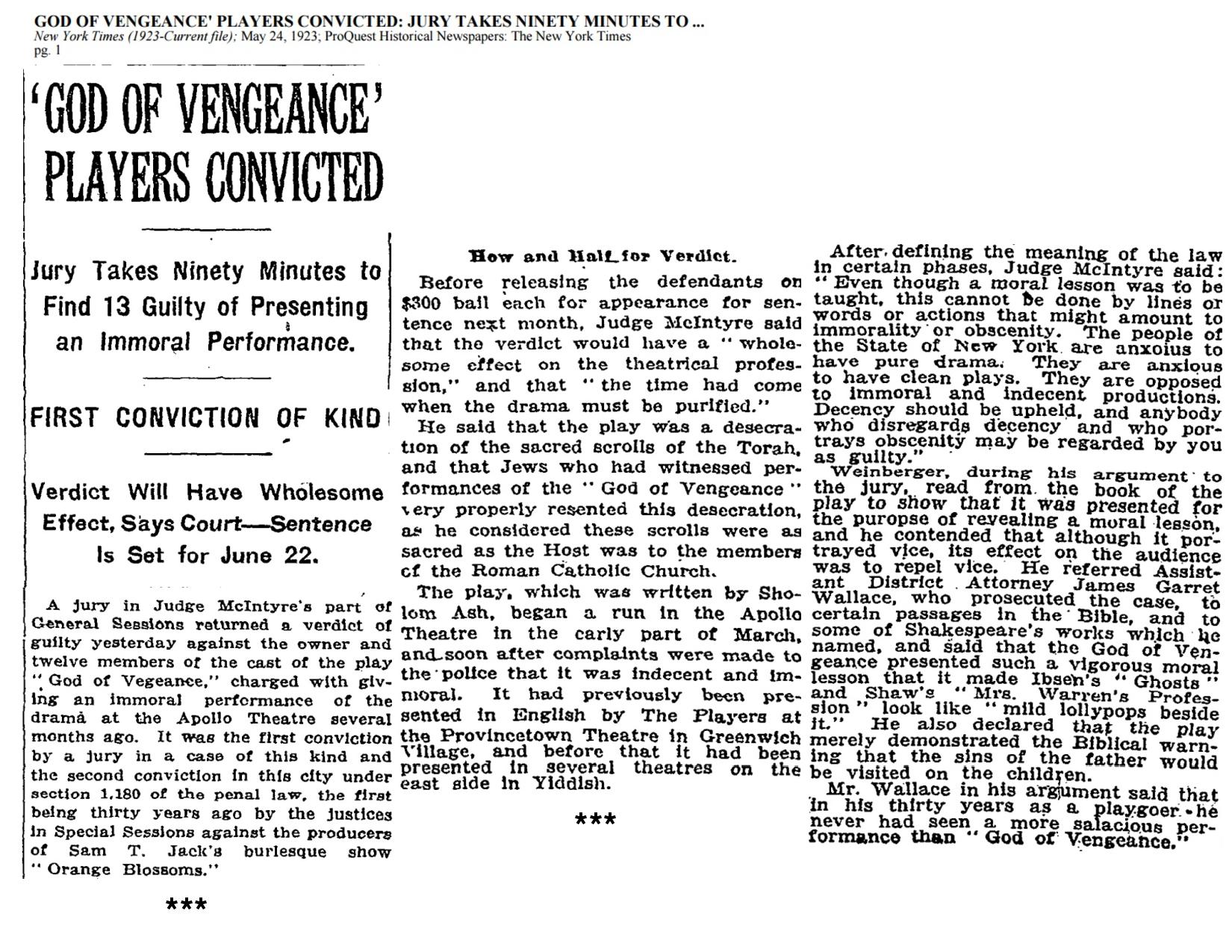From the Nashville Repertory Theater
Indecent, Immoral, and Impure, Oh My! Nashville Repertory Theatre Presents Indecent
Friday, February 2nd was the opening night of Nashville Repertory Theatre’s production of Indecent. Written by Paula Vogel, Indecent originally opened at the Court Theatre on Broadway in 2017. It tells the story of Sholem Asch’s play God of Vengeance, starting with its creation, following as it is performed in multiple European countries before coming to Broadway, and ending with Asch forbidding any future performances. Throughout this story are the themes of censorship, intolerance, the horror of the holocaust, and the enduring nature of art.

In 1907, Sholem Asch read his play, Got fun Nekome (God of Vengeance) to the founding father of modern Yiddish literature, I. L. Peretz. God of Vengeance tells story of a man who owns and lives above a brothel. He commissions the writing of a Torah scroll and wishes for his virgin daughter, Rifkele, to be a virtuous maiden so he can find her a respectable, Jewish husband. Instead, Rifkele falls in love with another woman: a prostitute named Manke. At the end, her father, enraged, tells Rifkele that she can pay him back for the Torah scroll by working at the brothel with Manke, and he throws the Torah across the room. Peretz was upset that Asch would write a play that portrays Jewish people in a negative way. He advised Asch to burn it. This interaction is one of the first scenes in Indecent and introduces us to one of the play’s main themes: censorship. Asch doesn’t follow Peretz’ advice and the play is very successful in Europe. When it finally reaches America, some people are unhappy with the subject matter. God of Vengeance is credited with presenting the first lesbian kiss on Broadway in 1923 at the Apollo Theatre on West 42nd Street. Along with translating the script to English, a beautiful scene with Rifkele and Manke dancing in the rain and falling in love is cut from the play to make it more “palatable” for the audience. Still, midway through one performance, a police detective informed the cast and producer that they were under arrest for obscenity. They went on trial and were found guilty, although the verdict was later overturned on appeal. The official violation of the penal code, The Court of New York is: “obscene, indecent, immoral and impure material.” Emphasizing another theme of Indecent: intolerance, Vogel places the actors that play Rifkele and Manke (Reina and Deine) also in a romantic relationship. At one point, broken-hearted, Deine cries onstage at the removal of the rain scene, changing the relationship in God of Vengance from one of passion and love to one of manipulation. She says “Now instead of us falling in love in this obscenity of a world, instead of me trying to rescue you-the new script has me entrapping you into a life of white slavery! I’ve been promoted to Head Pimp!”
Asch’s character is so traumatized by what he has seen in the aftermath of WWI (he is seeing the persecution of the Jewish people and the beginning of WWII) that he is in a state of deep depression and is unable to go to court to testify for the troupe. Lemml, the stage manager for Got fun Nekome, both in Europe and America, is heartbroken by his lack of support and goes back to Europe. He continues to put on the play back home because he believes in it so fervently. He is still putting on the play in a little attic in the Łódź Ghetto when they are all arrested and taken to a concentration camp. In a heartbreaking scene, we see the main characters in line for the gas chamber, Lemml imagines that the fictional characters Rifkele and Manke escape from the Nazi’s and run away together. At the end of the play, Asch is now an old man and is packing up to leave America because he is being persecuted by the House Unamerican Activities Committee. A young theatre student comes to ask him to look at his new English translation of Got fun Nekome. Asch refuses to look at it and states that he never wishes the play to be done again and echoes Pretez, telling the student to burn it. The student vows that he will one day produce the play. The last scene is the famous rain scene performed in Yiddish: Rifkele and Manke spin and dance in the rain, embracing each other.

Indecent runs about an hour and 45 minutes without an intermission and has a small main cast of seven actors and 3 musicians (a klezmer ensemble of clarinet, violin, and accordion). This means that every cast member played multiple roles and never really had any time off stage. It is a testament to the actors that it was never confusing, and it was always clear who they were playing. Some of the success must also be attributed to Heather McDevitt Barton, the costume designer. She made every character believable by adding small props or items of clothing to distinguish from one character to another (or from one time period to another). For example, by the end of play, when the troupe is performing Got fun Nekome in an attic in the ghetto the actors have put on threadbare coats to signify how poor, tired, and hungry they are.
The characters in Indecent also occasionally spoke or sang in Yiddish. Once their characters make their way to America, they speak in halting English, to show that they are struggling with the language. Deine says at one point, “Lou, in my head, I can hear those English words so good, but then when I open my mouth, it’s like the dust of Poland is in my throat.”
Thomas Demarcus stood out playing the lovably innocent and naive Lemml. He was so earnest in his passion for the play and for the theatre, and for Asch himself that it made it all the more heartbreaking when Asch doesn’t come testify for them in court. Sarah Aili and Delaney Amatrudo did a wonderful job as Deine and Reina playing Manke and Rifkele. The love between them, passionate as Manke and Rifkele, and enduring and steady as Dine and Reina was so true and pure. They sing “Weigala” together in stunning harmony in the scene at the gas chamber. In the script it says, “We have come to our Kaddish. “Wiegala” was written by Ilse Weber, a nurse at the Childrens Hospital at Theresienstadt. She sang this lullaby for the children in the wards. When it came time for the children to be transported to Auschwitz, Ilse volunteered to go with them. It is said she sang this song in line to the chambers: ‘The wind plays on the lyre, the nightingale sings, the moon is a lantern… sleep, my little child, sleep.’” Although the audience is not told this, and it is sung in Yiddish, the meaning of the song is beyond words, the feeling unmistakably clear in their haunting rendition. The ending of the play, as they perform in Yiddish as Rifkele and Manke under the rain, was poignant, almost painfully beautiful, showing the audience the enduring nature of art, and the ability of art to sustain us through even the worst of times.
It made me laugh, it made me cry, Nashville Repertory Theatre’s production of Indecent is amazing. In the executive director’s note, Drew Ogle says “you are seeing the only professional production of this play in the country right now.” You still have time to see it. Go now! https://www.tpac.org/event/2024-02-02-to-2024-02-11-indecent/




